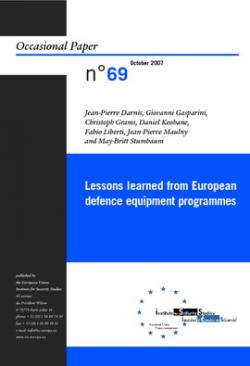Lessons learned from European defence equipment programmes

This Occasional Paper explores the issue of European armaments cooperation. Such cooperation between countries has often been difficult. Even so, European governments continue to collaborate on multinational equipment programmes for a number of reasons, and successful multinational programmes have manifold benefits. These benefits include, for instance, the possibility of meeting a capability requirement at an affordable price. Collaborative programmes allow greater economies of scale because of the larger order books. These savings also allow European governments to contemplate acquiring more advanced equipment (and share development costs), despite static defence budgets. Another advantage is the fact that common equipment can help countries work together on international missions: such interoperability is vital for the success of military coalitions. Also, governments gain political benefits from cooperation, and are perceived to be constructive EU partners. Moreover, multinational procurement encourages greater convergence of thinking about international security among EU governments, and this helps foster a common European strategic culture. Other positive side effects include technology sharing, technology development, common standards, integrated logistics and successful exports. This paper also discusses the challenges facing European arms cooperation , especially in the fields of juste retour, industrial consolidation and static defence budgets, research, technology and redundant industrial skills. Different national defence industrial policies make it difficult to develop common approaches to armaments cooperation. In particular, government protection of national defence industries has been one of the main problems in past cooperative programmes. Work-share arrangements, known as juste retour, guarantee that a national defence industry must receive work worth the full amount of its government’s financial contribution to a programme. Experience shows that the more governments and industrial interests are involved, the more difficult the cooperation. Governments also have vastly different types and sizes of defence industries. Six countries (France, Germany, Italy, Spain, Sweden and the UK) account for more than 90 percent of defence equipment production in the EU. Most governments, therefore, are primarily consumers rather than producers - although many smaller countries are major sub-contractors and component suppliers. Some parts of Europe’s defence industry have consolidated across borders (aerospace, IT). But the industry must consolidate further if Europe wants to play a significant role in the global defence industry. EU governments collectively spend roughly 190 billion euros on defence each year, but national defence budgets are either static or falling. Plus the governments only spend roughly 40 billion euros each year on procurement, research and development. Static defence budgets and low equipment spending means that a competitive defence industry is not sustainable on a national basis anymore. Slow progress in cross-border industrial consolidation also means that there are numerous redundant industrial skills across Europe. Some governments waste scarce procurement and development money on sustaining certain defence technologies nationally, which are usually too small or unsophisticated to be internationally competitive - thereby aggravating the problem of over-capacity. In sum, EU governments have little choice but to collaborate more on equipments programmes, and to manage those programmes more efficiently.
Basato su uno studio condotto da un consorzio formato da Institut des relations internationales et stratégiques (IRIS), Centre for European Reform (CER), Deutsche Gesellschaft für Auswärtige Politik (DGAP) e Istituto affari internazionali (IAI), nell'ambito di un contratto finanziato dall'Agenzia europea per la difesa (EDA). Gruppo di ricerca: Jean-Pierre Maulny e Fabio Liberti (IRIS), Daniel Keohane (CER), Christoph Grams e May-Britt Stumbaum (DGAP), Giovanni Gasparini e Jean-Pierre Darnis (IAI).
-
Dati bibliografici
Paris, EU Institute for Security Studies, ottobre 2007, 37 p. (EU ISS Occasional Papers ; 76) -
ISBN/ISSN/DOI:
978-92-9198-119-9



